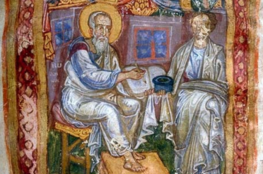I have been accused before of being uncharitable and harsh toward the Acton Institute and all of its works. Some claim I am distorting what they are “really doing” while unduly demonizing them when I should be praising their pro-market, pro-freedom agenda. Then I read thing like Dylan Pahman’s “Consumerism, Service, and Religion” over at the Acton Power Blog and quickly remember why I, a professing Catholic, cannot flatter Acton’s troubling worldview. Pahman, an ex-Calvinist Orthodox Christian, isn’t happy with Fr. Dwight Longenecker’s recent piece on “The Spoiling of America.” Why? Well, for one thing Longenecker’s anti-consumerist ethos doesn’t jibe with Pahman’s free-market religion, which includes lauding a free market for religion. Using Alexander Hamilton’s somewhat famous observation that “it is . . . absurd to make [religious] proselytes by fire and sword,” Pahman concludes that markets are the better — perhaps only? — alternative. On this point I’ll let the man speak for himself. Pardon the extended block quote.
The alternative to “fire and sword” is the market. On the demand side, people tend toward the religious community that best aligns with their interests. These interests are heavily shaped by family and cultural mores but not determined by them. On the supply side, however, religious groups face the requirement to provide a high quality product. If a church preaches that through repentance and faith in Jesus Christ, one can experience forgiveness, grace, and transformation, they actually need to be able to deliver the goods, so-to-speak. The Gospel they preach really needs to be “the power of God to salvation for everyone who believes” (Romans 1:16).
This has had the ill-effect that those dissatisfied with the product are more likely to go “church shopping” or, perhaps, take an entrepreneurial model and start their own church or denomination. But what is the alternative? Certainly state support for a church does not require “fire and sword” (witness: the Church of England today), but look not so far in the past and “fire and sword” are likely to be found (witness: the Church of England in the sixteenth and seventeenth centuries).
No, established churches today tend toward the less exciting but far more humane problem (assuming one views it as a problem) of rampant cultural faith. People show up to get married and baptize their children just because it’s what “everybody” does. And Western countries that still retain established churches also still have a religious market—they just offer subsidies and privileges to the religious body of their choice, skewering the market toward a partial monopolistic arrangement for the established church. It’s religious cronyism vs. a free(r) market, but both are still markets.
All this is to say that if people are leaving churches in the United States because they feel more in touch with God elsewhere, more welcomed by the community, and so on, the solution is not to complain about the competition but to spend some time in self-reflection. What Gospel is your church preaching? How well does it live that out?
Blame consumerism if you will, or blame the cheap gimmicks of the competition, but I think we’d all do better to remove the plank in our own eyes first and ask ourselves what product we’re really selling.
While I don’t expect you to read through this text a second or third time, if you did you might notice a word missing: Truth. Like the finest agnostic the social sciences ever produced, Pahman’s pro-market explication is devoid of concern for the true religion, that is, the one which actually leads to God and secures man’s last end. Instead, it’s all about the “pitch,” the “quality,” and the ability of one church or sect to meet the emotional-existential needs of people in society without any reflection that some of those alleged needs may be nothing more than perverted wants. From both a Catholic and Orthodox perspective, Pahman’s market model borders on the obscene.
- “What’s that? You’re a woman who feels called to the priesthood? Well, sorry, neither of the Apostolic churches are offering that today; go see the Episcopalians down the street.”
- “Yes, you’re divorced and remarried, but the first marriage is still sacramentally valid. Well, the Orthodox have a great deal going where you can actually get your second, fornicative, union blessed!”
- “I agree. The mystery of the Holy Trinity isn’t for everyone. I think the Unitarian brand is more your style.”
- “Hell isn’t very pleasant to think about, and I can see you’re not interested in an allegedly all-loving deity who would send people there. Have you considered Rob Bell’s church?”
- “We preach Christ crucified, a stumbling block to the Jews, foolishness to the Gentiles, and just so unhip. Perhaps Buddhism is right for you.”
When St. Paul set off across the Roman Empire, he was not out to market a new brand or undercut what the pagan cults were selling. He was there to witness to the Truth, as unpleasant, disturbing, and contradictory as it no doubt seemed to Jewish and Gentile minds alike. When our Lord Jesus Christ was on earth, He uttered “hard sayings” which caused his followers to flee. Just think how much more successful Christ’s divine ministry would have been if He had only consulted some economic advisors to tell Him what was in spiritual style in and around 1st C. Palestine. Think, too, how many more people the Catholic Church in America could put in the pews each week if we just dropped all of this intolerant stuff about homosexuality or gave a green light to contraception and abortion. Heck, while we’re at it, shouldn’t the Catholic Church just step back and let the people decide what they want from it? Eternal life? Check. No hell? Check. Guitars and drums at Mass? Check, check, check. The funny thing is, in the hands of delusional shepherds and hopelessly lost sheep, the Catholic Church has tried its hand at the market and failed. Just like at the Novus Ordo Missae — it’s full of “options” to meet the “needs” of presider and parishioner alike. What a wonderful breath of fresh air it has been compared to that statist, top-down, command-planned old Mass with its inflexible use of Latin and no customer service. (“The guy had his back to us practically the whole time!”)
Maybe Pahman can’t be blamed entirely for his indifference to the truth when discussing the religious market. As a convert to Orthodoxy he is undoubtedly familiar with the Chronicle of Nestor and the (likely apocryphal) story of St. Vladimir’s conversion. In it, the great Prince Vladimir sends emissaries to various religious groups, including the Greeks. Upon returning from the Greeks and their liturgy, the emissaries told the prince “[they] did not know whether [they] were in heaven or upon earth.” Upon hearing this pitch, Vladimir decided to be baptized. Perhaps that was the birth of the religious consumerism Pahman is infatuated with today.



